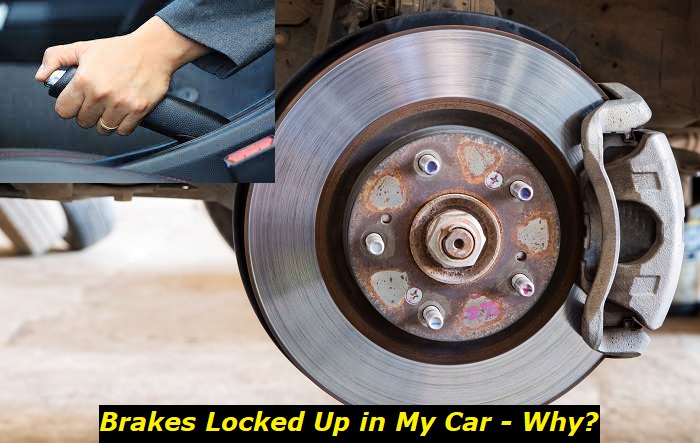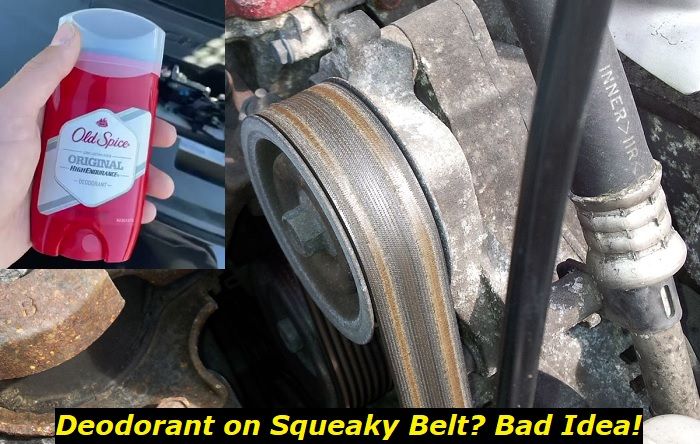The brakes in your car may have locked up because the car has been sitting for a very long time or because there is a problem with one of the braking systems. Solving this issue may be as straightforward as driving the car back and forth for a minute or as complicated as taking apart the entire braking system and replacing quite expensive parts.
Brake caliper problems highlights
- Level of urgency:super-urgent
- DIY diagnostics:impossible
- DIY repairs:impossible
- Price for repair:$300 - $600
- Common symptoms:noise when driving, bad braking, locked-up wheels
- Commonreasons:old caliper, physical damage
- If ignored:locked wheels, dangerous driving, accidents

Why could my brakes lock up? Finding the reason
First of all, you should be ready to identify the symptoms to avoid extra damage to your vehicle. Usually, the brakes lock up in just one wheel and if this is a non-drive wheel, you may still make the car move. Your drive wheels will rotate and drag the non-rotating wheel. This will ensure disastrous handling and zero traction. Also, accelerating will be impossible.
If this happens to your vehicle, stop it immediately and check each wheel to find out the one that is the culprit of this problem. Once you identified the problematic wheel, you should find out the reason for its locking up.
Here are some of the most common reasons for the brakes lock up in one of the wheels:
1. Too long sitting
When a car sits for some time without moving, rust comes into action. Your brake rotors and pads aren't made of metal that can resist corrosion. It means they will rust after some time. If the car sits for a week, it's not likely to cause brake lock-up. But when it comes to months, the blocked wheel is just a natural thing.
Basically, the corrosion combines the brake pad and the rotor into a single part and that's why the wheel doesn't move. This may happen with drum brakes or disc brakes of any type.
To solve this problem, you may try driving your car back and forth several times and hope that the wheel can unlock without taking apart the entire system. If this doesn't help, try jacking up the car and turning this wheel with the help of some metal tool that you will use as a lever to improve the power.
If nothing helps, you will need professional help. If you know how to repair brakes, you may try solving the issue on your own. But doing this job without proper experience is not recommended.
2. Broken brake pad
A brake shoe consists of a metal body and soft pads. When you are using OEM shoes, it's highly unlikely that they may break or cause any problems until they are worn out completely. But aftermarket brake shoes are not as reliable.
One of the common problems with low-quality brake shoes is that the pads are disconnected from the metal body. In disc brakes, these pads are usually falling down to the road and the metal part will scratch the disc. But there is little chance of locking up. But in drum brakes, the pad just doesn't have any way out. It may get stuck between some mechanisms and literally block the wheel.
Exactly drum brakes usually cause this spontaneous wheel locking-up issue. But if pads are broken in disc brakes, they may also cause this problem, in some circumstances.
To solve this issue, check the brakes. If you see that one of the pads is destroyed, you should replace the pad and this may solve the problem.
3. Brake cylinder malfunction
Each wheel has a brake cylinder that pushes the brake fluid toward the pad once you press the pedal. But those cylinders may malfunction and they will constantly create pressure and hold the wheel locked up at all times.
Checking the brake cylinder is pretty complicated and you are unlikely to do this on your own. But you should just know about this problem and refer to it when you understand that no other reason could have caused this locking up.
Also, repairing this issue is not that easy, so I recommend letting professionals do that for you.
4. Parking brake malfunction
In most vehicles, the parking brake system is now electronically controlled. But it doesn't stop it from malfunctioning. Mechanical parking brakes also can go bad and lock your wheels. This usually happens when you apply the parking brake and then release the brake lever but the brake stays on and locks the wheels.
Checking this up is really easy. Usually, if both of your rear wheels are blocked, the issue is exactly with the parking brake. It just got stuck and doesn't want to release the pads.
Unfortunately, solving this problem is not easy. You will need to take apart the braking system and replace some parts like parking brake actuators or wires. Again, better let specialists do this job for you.
5. Damaged wheel
Your wheel may have been locked up because of the road accident. Maybe, some other car hit this wheel and it locked up. Or maybe, you hit the curb when parking the car. Any kind of damage may cause problems with rotating the wheel. It's not always connected with brakes. Sometimes, the hub or wheel mounting or any other part may be in charge.
If your vehicle had some accidents recently, you may need to take the wheel off and see what happened with the hub, braking system, and suspension. When your vehicle changes its location even for a couple of millimeters, it won't rotate correctly.
After any road accident, you should have the suspension and wheel hubs inspected if a certain wheel or some wheels may have been damaged during the impact.
6. ABS failure
This problem is not as common but it can also lock up one wheel or even all wheels in your car. Depending on the type of ABS system used in the vehicle, it can glitch and malfunction and eventually lock up the wheel because it gets wrong readings of some sensor or the control unit is glitching.
The ABS is used in several safety features of modern cars like automatic braking, collision mitigation systems, etc. These systems have dozens of sensors and sonars located all over your vehicle. Chances are that after some time and some miles, these sensors will lose connections or just go bad. Whenever this happens, the control unit may falsely think it needs to block the wheels.
Also, water damage is a very common reason for problems with ABS or collision mitigation systems. Water-damaged sensors or control modules can glitch badly and block your wheels.
What should you do right after you get this problem?
When you understand that one of the wheels in your vehicle is not rotating, you should stop the car. Driving with this problem is not allowed and not recommended. You can easily get into an accident if you try accelerating. Also, you may damage your engine, and transmission, and make your ECU go mad trying to understand what's going on.
Here are the steps you should take when you find the brakes locked up in your car:
- stop the vehicle immediately and turn on the emergency light if needed to show other drivers that the car is not moving;
- try to analyze and understand what could be the reason for this problem;
- try using recommendations that I gave earlier in this article - drive your car back and forth, jack it up, and try to rotate the wheel;
- if nothing helps, call a tow truck to help you move to the repair shop or to the dealership;
- tell the mechanic everything you know about the problem and its symptoms;
- have the vehicle inspected and repaired - usually, a good mechanic will find a problem for 5-10 minutes.
Please avoid trying to drive your car with such a condition of brakes even very slowly. This may not only lead to accidents and dangerous road situations but will most likely damage the vehicle. At least, you will tear the tire and will need to buy a new one.
Final thoughts
Locked-up brakes in your car are not something that you want to experience. When you notice that the vehicle can't accelerate or just can't move, inspect the wheels and find out which one is malfunctioning. After that try some methods of easy repair that I suggested in the first part of the article.
To prevent your brakes from blocking, don't allow your car to sit for more than a week or two, and regularly have your braking system inspected. If you suspect that there is water damage to control units or sensors, have them checked thoroughly in the dealership.
About the authors
The CarAraC research team is composed of seasoned auto mechanics and automotive industry professionals, including individuals with advanced degrees and certifications in their field. Our team members boast prestigious credentials, reflecting their extensive knowledge and skills. These qualifications include: IMI: Institute of the Motor Industry, ASE-Certified Master Automobile Technicians; Coventry University, Graduate of MA in Automotive Journalism; Politecnico di Torino, Italy, MS Automotive Engineering; Ss. Cyril and Methodius University in Skopje, Mechanical University in Skopje; TOC Automotive College; DHA Suffa University, Department of Mechanical Engineering






Add comment